

| Online: | |
| Visits: | |
| Stories: |

| Story Views | |
| Now: | |
| Last Hour: | |
| Last 24 Hours: | |
| Total: | |
With apologies to General de Gaulle
We don’t say it enough but Charles de Gaulle was right to say “Non”.
Yes he was primarily concerned with France’s national interest. That’s not a bad thing for a national leader to be concerned with. But he also spotted when interests were different and incompatible. When he vetoed our original membership application for what was then the European Economic Community he stated:
England [sic] in effect is insular, she is maritime, she is linked through her interactions, her markets and her supply lines to the most diverse and often the most distant countries; she pursues essentially industrial and commercial activities, and only slight agricultural ones. She has, in all her doings, very marked and very original habits and traditions.
It’s a statement that could have been made by almost any British Eurosceptic over the last fifty years. And it’s ultimately proved correct.
The United Kingdom never shared the vision of the European Union as a whole. That’s why we ultimately could never be satisfied. When we did eventually get in (Georges Pompidou was wrong to say “Oui”), we kept needing to be satisfied. Either the project had to be transformed to our approval or the UK had to go places it really didn’t want to. And so began endless fudges – renegotiations, rebates, opt-outs, Europe a la carte etc… even while the project as a whole advanced. The situation became ever more messy. In fact, I’m surprised the EU never decided to throw us out.
For sure not everyone in the UK took the same view. Some embraced the European dream. Others came to see it as the wrong direction. And some tried to fudge it for the advantages, but the benefits and drawbacks were not shared evenly. The result was debate over decades as the EU increasingly headed onwards, crippled by a lack of a direct democratic mandate for what it had now become. Holding a referendum on staying under the 1975 renegotiation meant the door of direct democracy had been opened on this. Promises of further referendums never materialised despite expectations being raised. At some point one would have come, forcing the issue to be settled.
Today we trigger Article 50 and begin the process of extracting ourselves. And it’s also time to posthumously apologise to De Gaulle for spending so long trying to prove he was wrong.
Source: http://timrollpickering.blogspot.com/2017/03/with-apologies-to-general-de-gaulle.html



